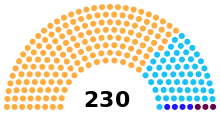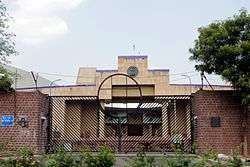Madhya Pradesh Legislative Assembly
| Legislative Assembly of Madhya Pradesh मध्य प्रदेश विधानसभा | |
|---|---|
| 7th Assembly | |
| Type | |
| Type | |
| Leadership | |
Speaker | |
Deputy Speaker |
Rajendra Singh, BJP Since Jan 9, 2014 |
Leader of Opposition | |
Deputy Leader of Opposition | |
| Structure | |
| Seats | 230 |
 | |
Political groups |
BJP (166) |
| Elections | |
| First-past-the-post | |
Last election | 25 November |
| Meeting place | |
| The Vidhan Bhavan, seat of the Legislative Assembly | |
| Website | |
| http://mpvidhansabha.nic.in/ | |
The Madhya Pradesh Vidhan Sabha or the Madhya Pradesh Legislative Assembly is the unicameral state legislature of Madhya Pradesh state in central India. The seat of the Vidhan Sabha is at Bhopal, the capital of the state. It is housed in the Vidhan Bhavan, an imposing building located at the centre of the Capital Complex in the Arera Hill locality of Bhopal city. The term of the Vidhan Sabha is five years, unless dissolved sooner. Presently, it comprises 230 members who are directly elected from single-seat constituencies and one nominated member. Ishwar Das Rohani was speaker of the house since 2003. Gyan Singh took over as temporary speaker after Rohani died of cardiac arrest on 5 November 2013. The present speaker is Shri Sitasharan Sharma, who was elected on January 9, 2014. Congress MLA Rajendra Singh was elected deputy speaker on January 10, 2014.

History
The history of the Madhya Pradesh legislature can be traced back to 1913, as the Central Provinces Legislative Council was formed on 8 November of this year. Later, the Government of India Act 1935 provided for the elected Central Provinces Legislative assembly. The first elections to the Central Provinces Legislative Assembly were held in 1937.
After Indian independence in 1947, the erstwhile province of Central Provinces and Berar, along with a number of princely states merged with the Indian Union, became a new state, Madhya Pradesh. The strength of the legislative assembly of this state was 184.
The present-day Madhya Pradesh state came into existence on 1 November 1956 following the reorganisation of states. It was created by merging the erstwhile Madhya Pradesh (without the Marathi speaking areas, which were merged with Bombay state), Madhya Bharat, Vindhya Pradesh and Bhopal states. The strengths of the legislative assemblies of Madhya Bharat, Vindhya Pradesh and Bhopal were 79, 48 and 23 respectively. On 1 November 1956 the legislative assemblies of all four erstwhile states were also merged to form the reorganised Madhya Pradesh Vidhan Sabha. The tenure of this first Vidhan Sabha was very short, and it was dissolved on 5 March 1957.
The first elections to the Madhya Pradesh Vidhan Sabha were held in 1957 and the second Vidhan Sabha was constituted on 1 April 1957. Initially, the strength of the Vidhan Sabha was 288, which was later enhanced to 321, including one nominated member. On 1 November 2000, a new state, Chhattisgarh, was carved out of Madhya Pradesh state. As a result, the strength of the Vidhan Sabha was reduced to 231, including a nominated member.[1] The present house, the Thirteenth Vidhan Sabha, was constituted on 11 December 2008.
The present building was designed by Charles Correa in 1967, and it was the recipient of the Aga Khan Award for Architecture in 1998.[2]
On 16th February, 2016 Narayan Tripathi won the Maihar bypoll on a BJP ticket (earlier he held the same seat on a Congress ticket).
Political parties
For results of Lok Sabha and Vidhan Sabha in Madhya Pradesh from 1951 to date, see: Elections in Madhya Pradesh
See also
- List of constituencies of Madhya Pradesh Vidhan Sabha
- Elections in Madhya Pradesh
- Shivraj Singh Chouhan Third ministry (2013–)
Notes
- ↑ "Madhya Pradesh Legislative Assembly". Legislative Bodies in India website. Retrieved 16 December 2009.
- ↑ Vidhan Bhavan, (ArchNet)
External links
Madhya pradesh assembly elections 2013 details